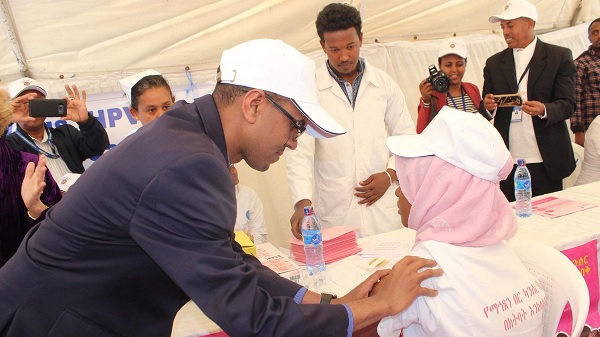
The national HPV vaccination campaign targets to address some 1.1 million young girls during the current Ethiopian 2018/19 fiscal year so as to protect them from cervical cancer caused by HPV infection
ADDIS ABABA (Xinhua)–The Ethiopian Ministry of Health on Monday launched a national human papillomavirus (HPV) vaccination program with an aim to protect some 1.1 million Ethiopian girls from cervical cancer during the current Ethiopian fiscal year.
Speaking at the launch of the program, Ethiopia’s Minister of Health Amir Aman stressed that “cervical cancer is preventable” if young girls are properly vaccinated.
The national HPV vaccination campaign targets to address some 1.1 million young girls during the current Ethiopian 2018/19 fiscal year so as to protect them from cervical cancer caused by HPV infection, Dr. Aman said.
The UN World Health Organization (WHO) identifies HPV infection as the major cause of approximately 68,000 cases of cervical cancer each year in Africa.
“Very delighted to launch national HPV vaccination program today! We’ll vaccinate 1.1 million girls this year to protect them from cervical cancer caused by HPV infection. Indeed very grateful for the continued support of @GAVI & all our partners. Cervical cancer is PREVENTABLE!” Ethiopia’s Minister of Health, Amir Aman (MD), on his Twitter
WHO, however, indicated that the figure most likely represents a conservative estimate due to the health challenges in health information systems and cancer registries in the African continent.
Despite cervical cancer is a preventable disease, it is the most common cause of cancer in the African continent where it accounts for 22 percent of all female cancers and 12 percent of all newly diagnosed cancer in both men and women every year, according to WHO.
Some 34 out of every 100,000 women are diagnosed with cervical cancer in Africa, while 23 out of every 100,000 women die from cervical cancer every year in the continent.
Cervical cancer, which is caused by the sexually transmitted HPV, affects younger age groups as a result of early sexual activity, multiple sexual partners, and exposure to other sexually transmitted infections such as HIV, according to WHO.
Source: Xinhua
